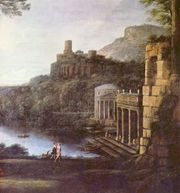Egeria
Home | Latíné | Deutsch | Español | Français | Italiano | Magyar | Português | Română | Русский | English
⚜⚜⚜ Site Index - Key Pages ⚜⚜⚜
Egeria, nymph, legendary consort and instructor of Numa Pompilius in the religion and rituals of the Roman people. This was in the sacred grove of Carmentis. She is one of the Camenae, spring deities. Scholars agree that the etyomology of her name is from the indo-european word for lake; a true water deity.[1] The Camenae were equated with the Muses as they communicated with mortals by inspiration.
- Egeria also has a sacred grove nemus within the precints of the Temple of Diana of Aricia. Nymphs of fountain and springs were believed to have the power to restore health to the sick, especially Nymphs of the springs of Rome.
- Frontinus c. 4
- "Fontium memoria cum sanctitate adhuc exstat et colitur; salubritatem enim aegris corporibus afferre creduntur; sicut Camoenarum et Apollinis et Juturnae.'"
primus, oliviferis Romam deductus ab arvis,
Pompilius menses sensit abesse duos,
sive hoc a Samio doctus, qui posse renasci
nos putat, Egeria sive monente sua. - Ovid, Fasti 3.154
Quis mihi nunc dicet quare caelestia Martis
arma ferant Salii Mamuriumque canant?
nympha, mone, nemori stagnoque operata Dianae;
nympha, Numae coniunx, ad tua facta veni.
vallis Aricinae silva praecinctus opaca
est lacus, antiqua religione sacer;
hic latet Hippolytus loris direptus equorum,
unde nemus nullis illud aditur equis.
licia dependent longas velantia saepes,
et posita est meritae multa tabella deae.
saepe potens voti, frontem redimita coronis,
femina lucentes portat ab Urbe faces.
regna tenent fortes manibus pedibusque fugaces,
et perit exemplo postmodo quisque suo.
defluit incerto lapidosus murmure rivus:
saepe, sed exiguis haustibus, inde bibi.
Egeria est quae praebet aquas, dea grata Camenis:
illa Numae coniunx consiliumque fuit.
principio nimium promptos ad bella Quirites
molliri placuit iure deumque metu.
inde datae leges, ne firmior omnia posset,
coeptaque sunt pure tradita sacra coli.
exuitur feritas, armisque potentius aequum est,
et cum cive pudet conseruisse manus,
atque aliquis, modo trux, visa iam vertitur ara
vinaque dat tepidis farraque salsa focis. - Ovid, Fasti 3.259-94
Lucus erat, quem medium ex opaco specu fons perenni, rigabat aqua: quo quia se persaepe Numa sine arbitris velat ad congressum deae inferebat, Camenis eum lucum sacravit, quod earum ibi concilia cum coniuge sua Egeria essent. Liv., 1, 21,3
There was a sacred grove, with a never-ending spring which came from a dark grotto. Numa retired here alone in order to encounter the goddess. He consecrated this place to the Camenae, because here he sought the advice of his spouse Egeria.
She is mentioned in Livy XIX, XXI, Dionysius of Halicarnassus AR 2.61-2. Ennius, Ann. 119; Cicero De Legibus 1.1.4; Ovid, Fasti 3.154; 259-93; Martial 10.35 12-14; Juvenal, 3rd Satire 17., Plutarch The Parallel Lives; Life of Numa 4.
secondary sources
Roman Religion and the Cult of Diana at Aricia

Hardcover: 348 pages
Buy from Amazon: Canada UK USA
References
- ↑ "Egeria- a Lady of the Lake?" Meander, Issue 2, 2005. K. Witczak, D. Jedrzejczak
"Egeria- a Lady of the Lake?" Meander, Issue 2, 2005. K. Witczak, D. Jedrzejczak
